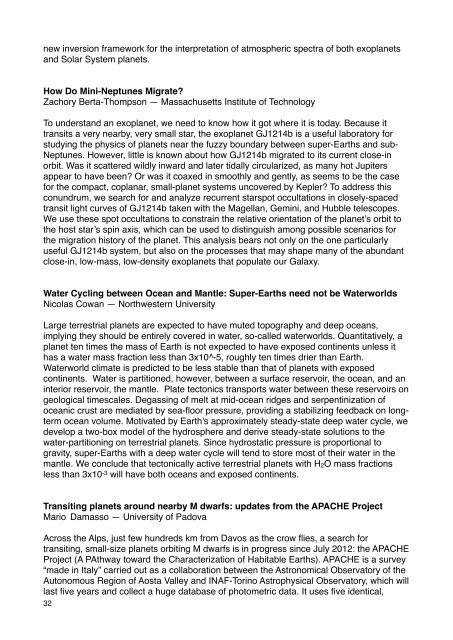Exoclimes_Conference_booklet1
Exoclimes_Conference_booklet1
Exoclimes_Conference_booklet1
You also want an ePaper? Increase the reach of your titles
YUMPU automatically turns print PDFs into web optimized ePapers that Google loves.
new inversion framework for the interpretation of atmospheric spectra of both exoplanets<br />
and Solar System planets.<br />
How Do Mini-Neptunes Migrate<br />
Zachory Berta-Thompson — Massachusetts Institute of Technology!<br />
To understand an exoplanet, we need to know how it got where it is today. Because it<br />
transits a very nearby, very small star, the exoplanet GJ1214b is a useful laboratory for<br />
studying the physics of planets near the fuzzy boundary between super-Earths and sub-<br />
Neptunes. However, little is known about how GJ1214b migrated to its current close-in<br />
orbit. Was it scattered wildly inward and later tidally circularized, as many hot Jupiters<br />
appear to have been Or was it coaxed in smoothly and gently, as seems to be the case<br />
for the compact, coplanar, small-planet systems uncovered by Kepler To address this<br />
conundrum, we search for and analyze recurrent starspot occultations in closely-spaced<br />
transit light curves of GJ1214b taken with the Magellan, Gemini, and Hubble telescopes.<br />
We use these spot occultations to constrain the relative orientation of the planet’s orbit to<br />
the host star’s spin axis, which can be used to distinguish among possible scenarios for<br />
the migration history of the planet. This analysis bears not only on the one particularly<br />
useful GJ1214b system, but also on the processes that may shape many of the abundant<br />
close-in, low-mass, low-density exoplanets that populate our Galaxy.<br />
Water Cycling between Ocean and Mantle: Super-Earths need not be Waterworlds<br />
Nicolas Cowan — Northwestern University<br />
Large terrestrial planets are expected to have muted topography and deep oceans,<br />
implying they should be entirely covered in water, so-called waterworlds. Quantitatively, a<br />
planet ten times the mass of Earth is not expected to have exposed continents unless it<br />
has a water mass fraction less than 3x10^-5, roughly ten times drier than Earth.<br />
Waterworld climate is predicted to be less stable than that of planets with exposed<br />
continents. Water is partitioned, however, between a surface reservoir, the ocean, and an<br />
interior reservoir, the mantle. Plate tectonics transports water between these reservoirs on<br />
geological timescales. Degassing of melt at mid-ocean ridges and serpentinization of<br />
oceanic crust are mediated by sea-floor pressure, providing a stabilizing feedback on longterm<br />
ocean volume. Motivated by Earth's approximately steady-state deep water cycle, we<br />
develop a two-box model of the hydrosphere and derive steady-state solutions to the<br />
water-partitioning on terrestrial planets. Since hydrostatic pressure is proportional to<br />
gravity, super-Earths with a deep water cycle will tend to store most of their water in the<br />
mantle. We conclude that tectonically active terrestrial planets with H2O mass fractions<br />
less than 3x10 -3 will have both oceans and exposed continents.<br />
Transiting planets around nearby M dwarfs: updates from the APACHE Project<br />
Mario! Damasso — University of Padova<br />
Across the Alps, just few hundreds km from Davos as the crow flies, a search for<br />
transiting, small-size planets orbiting M dwarfs is in progress since July 2012: the APACHE<br />
Project (A PAthway toward the Characterization of Habitable Earths). APACHE is a survey<br />
“made in Italy” carried out as a collaboration between the Astronomical Observatory of the<br />
Autonomous Region of Aosta Valley and INAF-Torino Astrophysical Observatory, which will<br />
last five years and collect a huge database of photometric data. It uses five identical,<br />
32


